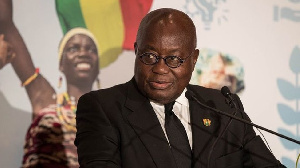 President of Ghana, Nana Addo Dankwa Akufo-Addo
President of Ghana, Nana Addo Dankwa Akufo-Addo
President Nana Addo Dankwa Akufo-Addo has said Ghana has been advocating that innovative financing must also address structural challenges beyond responding to immediate fiscal needs, by providing mechanisms to facilitate investments in health infrastructure, technology, the environment, and people that would bolster resilience and equitable recovery.
He said the International Monetary Fund (IMF’s) unprecedented six hundred-and-fifty-billion-dollar ($650 billion) Special Drawing Rights (SDRs) allocation offers a unique opportunity to provide additional financial resources to address the vast and surging inequities the pandemic has revealed, and a crisis to come.
Speaking at the 76th Session UN General Assembly on Wednesday, September 22, Mr Akufo-Addo said Africa’s allocation is some thirty-three billion dollars ($33 billion).
“If there was ever a time for an African Marshall Plan, it is now!,” he said.
He added “The SDR infusion should be seized upon as a catalytic effort to leapfrog Africa to the next level of human development and ensure sustained global prosperity.
“African leaders have advocated for a prudent and transparent channelling of twenty-five to thirty-five percent (25%-35%) of SDRs, that is one hundred and sixty to two hundred and thirty billion dollars, from wealthier to vulnerable countries, one hundred billion dollars ($100 billion) of which should be dedicated to Africa.
“We welcome the support of the European countries represented at the Africa Summit in France, the IMF, the G7 and G20, to some SDR redistribution. Mr President, proceeds of channelled SDRs should fund vaccine acquisition and manufacturing, climate and green investments, and a pan-African Stability Mechanism, like the European Stability Mechanism, that would safeguard financial stability on the continent.
“A part of the redistribution should also help fund the recapitalisation of the African Development Bank and Afreximbank to support industrialisation, private sector job creation and the African Continental Free Trade initiative. 5 Thirdly, we must re-position key multilateral organisations and international financial institutions such as the United Nations, the other Bretton Woods Institutions, and the G20 to reflect inclusiveness, support country investments in global public goods, and ensure fast-tracked financial support to build back better, and prepare for future pandemics.”
“For instance, the key to the G20’s effectiveness is that it achieves representative coverage of the global population and economy with a diversified enough number of leaders at the table, to enable speed and flexibility in deliberation and decision-making.”
On 2nd August 2021, the IMF Board of Governors approved a general allocation of SDR456.5 billion, equivalent to US$650 billion out of which about US$33.7 billion is for African countries including Ghana, to boost global liquidity and economic recovery following the devastating impact of the Covid-19 pandemic on lives and livelihoods.
The new SDR allocation which became effective on 23rd August 2021 will augment the additional financing needs of countries, especially low-income countries, caused by the impact of the pandemic on public finances.
The AfDB estimates that African governments require additional financing of about US$484.6 billion within the next three years to close the financing gap and to emerge from the COVID-19 crisis stronger and more resilient.
According to the IMF, the SDR allocation will benefit all members, address the long-term global need for reserves, build confidence, and foster the resilience and stability of the global economy. This historic SDR allocation will particularly help countries that are most vulnerable to immediately address the impact of the pandemic towards economic recovery.
This SDR allocation is in response to a global call to action, following the devastating effects of the pandemic, including an Africa-wide effort championed by Minister Ken Ofori-Atta and his colleague African Finance Ministers, the AU, UNECA, and supported by key international partners (including The IMF, The WB, The G20, The EU).